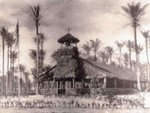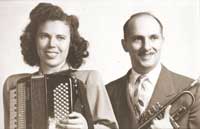 It was raining again. We piled all ten bags onto the church steps and waited for the Quito bus to come by. For two hours we waited in drizzly Shellmera, a small town on the outskirts of the Ecuadorian jungles. Late buses and rain are a daily occurrence.
It was raining again. We piled all ten bags onto the church steps and waited for the Quito bus to come by. For two hours we waited in drizzly Shellmera, a small town on the outskirts of the Ecuadorian jungles. Late buses and rain are a daily occurrence.
Finally, we saw the bus. It was jam packed, careening down the gravel road. The driver took one look at all our bags and almost passed us by. But when we yelled that we were going all the way to Quito, he stopped and let us on.
We squeezed aboard. People were already standing in the aisles. One man gave up his seat when he found out that we were going to the end of the line. The rest of us stood where we could.
After we got underway again, things settled down a bit. Two Quichua Indians were sleeping in one seat. They kept falling on top of each other. They were so comical that the whole bus full of people would roar with laughter as they flopped around. Riding in a bus for hours and hours makes the people inside become comradely and friendly with each other, especially Ecuadorians. They joked and laughed at each other all the time.
My mother began talking with a fellow passenger and he told us why the bus was late. The original driver had been caught driving without a license. The passengers had spent most of their time trying to get him out of jail, and finding another driver.
 The roads are very narrow, and at times when you meet another vehicle, you had to back up until a wide enough section of road could be found to pass in. Once when passing another bus, our bus was on the outside edge. I was sitting by the window, and when I looked out, I realized that the outside tires of the double wheel were actually hanging off the edge of the cliff.
The roads are very narrow, and at times when you meet another vehicle, you had to back up until a wide enough section of road could be found to pass in. Once when passing another bus, our bus was on the outside edge. I was sitting by the window, and when I looked out, I realized that the outside tires of the double wheel were actually hanging off the edge of the cliff.
Another time, when the rains had washed out a section of the road, we had to drive over what looked like a little river full of large round boulders. We got to just about the middle when the bus started to float. We almost got washed right off the cliff edge, but managed to get to the other side. After that, I always got OFF the bus and crossed the washout by walking through them. I also got off when buses were passing on narrow sections of road.
I almost got sick from the swaying bus and smell of the people, so I went up front behind the driver. It was too hard to stand, so I crouched in the aisle.
The conductor, seeing my uncomfortable position, offered his seat. It wasn't much better. The seat faced the driver who kept leering at me. The scenery was beautiful, but I was too uncomfortable to pay much attention. The driver had a peculiar way of smiling at me, shifting gears, beeping the horn, and making a 90* turn, all at the same time. It was during one of these feats that we met a jeep head on. It hadn't responded to the customary 'beep beep" that announced our approach. Fortunately, the road was wide enough at this point, and we swooped by.
The custom of honking a warning as you approach a curve is an important feature of safe driving on those roads. I road a bus once where the horn had conked out, and believe me, it was scary! We had to inch around corners, and everyone made as much noise as possible.
Every once in a while, the conductor who was up on top with the baggage, would bang on the bus roof as a sign to let someone off. We would screech to a halt, then leave them in the dust, seemingly in the middle of no where.
A couple of bouncing, dusty hours later, we came to a relatively big town. My mother had secured a seat by a window, so I went back and sat by her.
While sitting there, we began talking to a Peace Corp volunteer. He was on his way to a remote mountain village. We shared our banana bread with him. It was the first American food he had eaten for months. He got off at Ambato with twelve hours of bus travel ahead.
In Ambato, we had a half hour rest stop and we changed drivers. Although it was dirty, and smelly, the town of Ambato did have a really unique feature. Public bathrooms. I might mention, that this is the only town where there were bathrooms that we could use. During that long ride, if you had to go and you were a man, it was no problem. Many of the native women would just get off the bus and go behind a bush some where. But I learned heroic bladder control!
The public toilets in Ambato often saved my life, but the were filthy! There were no doors on the facilities anywhere, not even on the stalls. The floors, walls, and seats were always covered with grime. The windows were not screened, glassed in, or anything, and people could (and did) look in at you whenever they wanted. A man sat in front and sold grungy toilet paper by the square.
 The cobblestone road is better from Ambato on, and fewer people were in the bus. The man sitting in front of us had a chicken under his seat. It laid an egg on the way, and the egg rolled down the aisle. My father picked it up to return it to the owner, but his thumb went right through it, and the owner told him to throw it out the window.
The cobblestone road is better from Ambato on, and fewer people were in the bus. The man sitting in front of us had a chicken under his seat. It laid an egg on the way, and the egg rolled down the aisle. My father picked it up to return it to the owner, but his thumb went right through it, and the owner told him to throw it out the window.
The people on the bus laughed about the chicken laying the egg for hours. Each time we stopped, they hollered out the window, telling everyone in sight about the chicken, and holding it up so everyone could see her for themselves.
There was a family of Quichua Indians crammed into the back, one long bench with about four too many people on it. They were coming home from a wedding, and they were drunk, and happy, and they laughed til they cried, almost rolling on the floor laughing about the chicken and the egg. Pretty soon we were laughing at them too.
Some hours later at Latacunga, the paved section of the Pan American Highway began. Without bumps and hairpin curves the trip became extremely monotonous and most everyone went to sleep. While it was often boring, I spent many hours in pleasant day dreaming on that section of road. This was the part of the highway that went high into the mountains, and over the passes. The hairpin curves and the cliff edges were gone, but the scenery was awesome. It was a tundra like area, too high up for trees, so it was all grasslands, cool, and often either misting, or foggy and eerie.
 No one lived up there except for a very few, very poor Indians who lived in sod and grass huts. Many times the fog we passed through was actually a cloud resting on the top of the mountain. Snow capped mountains ringed the area. And if you weren't acclimated to the altitude, you could certainly feel the effects of it here.
No one lived up there except for a very few, very poor Indians who lived in sod and grass huts. Many times the fog we passed through was actually a cloud resting on the top of the mountain. Snow capped mountains ringed the area. And if you weren't acclimated to the altitude, you could certainly feel the effects of it here.
Finally, after eight hours of travel, we came down out of the mountain passes, and rolled into the Ecuadorian capital. The quaintly picturesque city of springtime, Quito, where on a clear day you can see eight snow capped mountains.
~remembrances of Shirley Gibson
from an essay written in 1968
 We have cause to rejoice because some have come to know the Lord in the past few weeks. Some who seemed so hard and given to witchcraft that they seemed impossible to be reached. But God is able to do the impossible. Petsain had the most evil looking eyes and was so hard. One day he got sick and thought he was going to die. After treatment, he got better and started really listening to God's Word and at Christmas, he gave his heart to the Lord, or as they say "I took God's road and now I am very happy." He needs prayer because the only way he has to grow is to come to church and listen to the messages. There is no Bible for him to read and besides he doesn't know how to read.
We have cause to rejoice because some have come to know the Lord in the past few weeks. Some who seemed so hard and given to witchcraft that they seemed impossible to be reached. But God is able to do the impossible. Petsain had the most evil looking eyes and was so hard. One day he got sick and thought he was going to die. After treatment, he got better and started really listening to God's Word and at Christmas, he gave his heart to the Lord, or as they say "I took God's road and now I am very happy." He needs prayer because the only way he has to grow is to come to church and listen to the messages. There is no Bible for him to read and besides he doesn't know how to read.







































